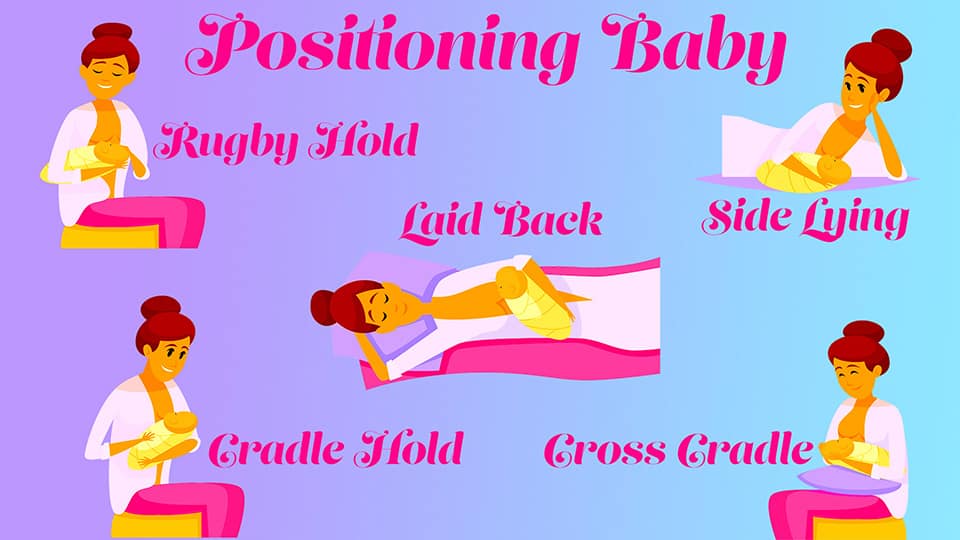Benefits, Tips & Support for Breastfeeding
How you feed your baby will always be your choice. Just make sure that you are fully informed in your decisions before choosing between breastfeeding and formula feeding.
Breastfeeding is the natural way to feed your baby. Making it the most beneficial to you and your baby. Breast milk provides all the essential nutrients that your baby needs to grow and develop, and it helps to protect them from infections and illnesses. Breast milk is all your baby needs for the first 6 months of their life, no matter the snow or sun it adapts accordingly. Breastfeeding also has numerous benefits for the mother, including a reduced risk of certain cancers.
It is never too early to research and learn. Even if you have done it before. Even if you are still feeding an older child. It is always best to refresh your memory. You would be surprised how much you might have forgotten. Plus, it is always good to reassure yourself that this journey may be different to the last.
If you are surrounded by formula feeding but wish to try breastfeeding then I recommend research.
Research the support available in your area, as this can be constantly changing.
Research for any new information on breastfeeding. Making sure to look at reputable sources, I have listed several at the bottom of this post.
Support
Surround yourself with like-minded people.
Surround yourself with those that will support your choices and support you.
Surround yourself with people who will tell you what you’re doing right, not what they think you are doing wrong.
Surround yourself with people that will hold your baby while you nap, not those that say, “Well if you did this” or “Well it’s your fault for doing that.”
Surround yourself with people who will accept that you might feel touched out, tired, or overwhelmed.
It is NOT possible to hold your baby too much. It is NOT possible to respond to your baby too much. It is NOT possible to breastfeed your baby too much. You CANNOT overfeed a breastfed baby.
And repeat.

I have been quite lucky in my breastfeeding journey. I just went with the flow and followed my baby’s lead and trusted in my body. Nature is an amazing thing, and sometimes we must believe in what it created. Our bodies are more powerful than we know, and they should be respected.
Benefits of breastfeeding for your baby
- Breast milk provides all the essential nutrients that your child needs to grow and develop. You may hear comments about your baby needing Vitamin D because your breast milk does not have it. This is because EVERYONE in the UK should be taking Vitamin D, not just breastfed babies. Your breastmilk has Vitamin D, but if you are not getting enough then neither is your milk. Young babies that are formula fed also require Vitamin D supplements.
- Breast milk also helps to protect your baby from infections and diseases using antibodies and immune-boosting factors. This is because your breastmilk is always changing. So, should you or your baby become ill, your body will create and pass on the antibodies required to help your baby through the illness. You may find they either do not even get the illness you had or that it is mild in comparison. So, if you are ever ill just keep feeding that baby; by doing so you are protecting them.
- Breastfed babies have a reduced risk of ear infections, respiratory infections, and gastrointestinal infections. Studies have also shown that breastfed babies have a lower risk of certain chronic conditions such as asthma and allergies. Breastfeeding also reduces the risk of SIDS.
- Breastfeeding also provides emotional benefits to your baby. Breastfeeding is an opportunity for you and your baby to bond and form a close emotional attachment. Breastfeeding can provide security and comfort for your baby after having spent so long inside you.
Benefits for you as the breastfeeding parent
- Breastfeeding helps stimulate the release of oxytocin, which helps the uterus contract and help postpartum bleeding.
- Breastfeeding also helps reduce the mother’s risk of breast cancer, ovarian cancer, and type 2 diabetes. It can also help with postpartum weight loss, as breastfeeding burns extra calories.
A successful breastfeeding journey requires proper preparation and support. Before your baby is born, it is beneficial for you to attend a breastfeeding class or speak with a breastfeeding professional. This can help prepare you for what to expect during the breastfeeding journey and provide you with the necessary knowledge and tools to make it a success.
Things to keep an eye on
Is your baby gaining weight steadily?
Is baby having at least 6 wet nappies in 24 hrs?
Is baby alert when awake?
Is baby content after a feed?
If your newborn is really tired and not waking for feeds then it is recommended to wake them at 3-hour intervals to feed, just until they are waking a little more. As not feeding will make them more sleepy and it becomes a cycle of your baby not getting what they need.
Please find more information on the sites listed at the bottom of the page.
It can feel quite overwhelming at first. It may seem like you are constantly feeding in those first few days, even those first few weeks plus. This can be totally normal as your baby is building up your supply. Remember, babies are human just like us and don’t always feel hungry or thirsty at the same times every day, or even the same amount of hungry or thirsty. Think, do you only have food/drink every three/four hours? If you have a sip of water now, does that mean you can’t have another drink for three hours? Silly right? Your baby is constantly growing and developing so needs that feed.
There are also many reasons that your baby may be feeding.

Just because baby is feeding more than you expected, doesn’t mean they require formula.
How to know your baby is feeding correctly
- You can see and hear your baby swallowing.
- Baby’s cheeks stay round and not hollow.
- Your breast feels softer after feeds.
- Your nipple is the same shape after a feed and does not feel sore.
- Baby appears content and satisfied.
As you get into the rhythm of breastfeeding you will find that there may become a pattern of feeding, but I don’t recommend assuming this will be the same for the rest of your journey. Baby will go through many phases, many growth spurts, teething and developmental leaps. Some of the growth spurts, when your baby is upping your supply, can make you feel like your baby is not getting what they need from the breast. This is not usually the case. Baby might also become fussy at the breast, and pop on and off, this can be normal.
If you are concerned, please seek professional help and support.
Remember that your baby did NOT read any parenting books and if you’re going to, make sure to find ones that are based on actual evidence. As I said above, research research research, but look in the right place. Speak to actual mums who have been through it. Go to breastfeeding antenatal classes. Read evidence-based knowledge from a reputable source, including lactation consultants. If a parenting book makes you feel strange, makes you go against what your motherly instincts are telling you, then throw it on the fire and forget about it. Believe in yourself, your instincts, and your ability. Don’t let others make you question yourself.
Things to think about
Initiation
Breastfeeding should be initiated as soon as possible after birth. The first few days after birth, you produce colostrum, which is a thick, yellowish milk that is packed with antibodies and other immune-boosting factors. It is important for your baby to receive colostrum as it helps establish your baby’s immune system and provides other important benefits. Breastfeeding should be done in a responsive way, which means your baby should be fed whenever they show signs of hunger. This can help establish a good milk supply and ensure that your baby receives all the nutrients they need. Signs of hunger in a newborn include lip smacking, rooting, and bringing hands to the mouth.
Latching & Positioning
This is super important. Your baby should be positioned with their body facing you and their arms free to move. You should support their shoulders, neck and back but allow them to tilt their head back. Then (Nose to Nipple, Chin to chest) and baby should open their mouth wide. Baby should take the nipple to the roof of their mouth. They should also have more than just the nipple in their mouth and their nose should be clear.
How to hold your baby
Different positions work for different women. When I first started breastfeeding my first, it took a few days before I could feed anyway other than lying down. Below is an infographic with a selection of different positions for you to try.

Problems
Though breastfeeding is the natural way to feed your baby, it doesn’t mean it will always be easy. If there is a pain when you feed, or you do not feel that baby is latching correctly then seek help from a breastfeeding professional such as a lactation consultant (IBCLC) or your midwife. There could be a possibility of tongue tie. Getting help straight away can help to ensure that your breastfeeding journey runs smoothly.
Engorgement and sore nipples are common breastfeeding issues. Engorgement occurs when the breasts become too full, and your baby has difficulty latching. If not dealt with this can lead to mastitis. To alleviate engorgement, you should express a small amount of milk before feeding. Sore nipples can occur when the baby is not positioned properly or is not latching correctly. To alleviate sore nipples, you should try different feeding positions and ensure that the baby is latching correctly.
Support
Breastfeeding can be challenging at times, and it is important for you to have a support system in place. This can include partners, family members, friends, or a lactation consultant. A lactation consultant can provide expert advice and support and can help troubleshoot any breastfeeding issues that may arise. However, does cost and there are other free options. You can also join any local breastfeeding groups in your area, where there are 1000s of women who can help, and peer support you. Sometimes you just need to know that there are others in the same storm.
Conclusion
Breastfeeding can be a wonderful and incredibly fulfilling journey for you as a breastfeeding mother. Seeing how your baby is growing all from what you are giving them. You are powerful and your body is incredible. Never let anyone tell you differently. Even if you struggle to breastfeed, you are still incredible.
Lastly, remember, comparing your breastfed baby to a formula-fed baby is not a good idea. Babies’ bodies digest formula differently from breastmilk, so may sleep longer and feed less. This may sound like bliss, but babies are designed to not sleep too long or go into deep sleep, as a defence against SIDS.
Resources
The below resources are taken from the website of Breastfeeding Mum Meets, a charity based in Norfolk, UK. They have been vetted by the volunteers and are reputable sites.
Positioning & Latch
Breastfeeding Positions | Feeding Your Baby | Start for Life (www.nhs.uk)
Positioning – La Leche League International (llli.org)
Latching and Positioning Resources • KellyMom.com
Clustering Feeding
Cluster Feeding and Fussy Evenings • KellyMom.com
Feeding a new-born
Breastfeeding: the first few days – NHS (www.nhs.uk)
Tongue Tie
Breastfed babies and water
Do Breastfed Babies Need Water – The Breastfeeding Companion
Mastitis
Lactation Consultants
Lactation Consultants of Great Britain – Charity (lcgb.org)

Leave a Reply